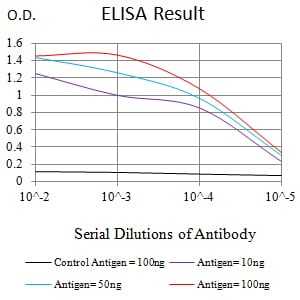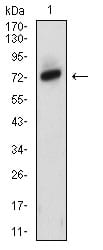

| WB | 1/500 - 1/2000 | Human,Mouse,Rat |
| IF | 咨询技术 | Human,Mouse,Rat |
| IHC | 咨询技术 | Human,Mouse,Rat |
| ICC | 技术咨询 | Human,Mouse,Rat |
| FCM | 咨询技术 | Human,Mouse,Rat |
| Elisa | 1/10000 | Human,Mouse,Rat |
| Aliases | SRK; STD; TZK; STCD; IMD48; ADMIO2; ZAP-70 |
| Entrez GeneID | 7535 |
| clone | 6D9C2 |
| WB Predicted band size | 69.9kDa |
| Host/Isotype | Mouse IgG1 |
| Antibody Type | Primary antibody |
| Storage | Store at 4°C short term. Aliquot and store at -20°C long term. Avoid freeze/thaw cycles. |
| Species Reactivity | Human |
| Immunogen | Purified recombinant fragment of human ZAP70 (AA: 169-390) expressed in E. Coli. |
| Formulation | Purified antibody in PBS with 0.05% sodium azide |
+ +
以下是3条关于ZAP70抗体的参考文献,按文献名称、作者和摘要内容概括列举:
1. **文献名称**:*ZAP-70: A 70 kDa Protein-Tyrosine Kinase That Associates with the TCR ζ Chain*
**作者**:Chan, A.C. et al.
**摘要**:首次发现并描述了ZAP70作为T细胞受体(TCR)信号通路中的关键酪氨酸激酶,阐明其通过与TCR ζ链结合激活下游信号,调控T细胞免疫应答的分子机制。
2. **文献名称**:*ZAP-70 Expression as a Marker of Prognosis in Chronic Lymphocytic Leukemia*
**作者**:Crespo, M. et al.
**摘要**:研究证明ZAP70抗体检测可用于慢性淋巴细胞白血病(CLL)的临床分型,ZAP70阳性患者预后较差,为CLL的分子诊断和分层治疗提供了依据。
3. **文献名称**:*Defective T Cell Receptor Signaling in Mice Lacking the Thymic Isoform of p59fyn*
**作者**:Elder, M.E. & Lin, T.A.
**摘要**:通过动物模型揭示ZAP70缺陷导致严重联合免疫缺陷(SCID),证明ZAP70对T细胞发育和功能的关键作用,为相关免疫疾病机制研究奠定基础。
4. **文献名称**:*Structural Basis for ZAP-70 Kinase Autoinhibition and Its Deregulation in Immunodeficiency*
**作者**:Wang, L. et al.
**摘要**:解析了ZAP70的晶体结构,阐明其自抑制机制及突变导致功能异常的分子基础,为开发靶向ZAP70的抗体或药物提供理论支持。
以上文献涵盖ZAP70的基础机制、临床应用及结构研究,均为该领域经典或高影响力研究。
ZAP-70 (zeta-chain-associated protein kinase 70) is a cytoplasmic tyrosine kinase critical for T-cell receptor (TCR) signaling and immune system function. It belongs to the Syk family of kinases and is primarily expressed in T cells and natural killer (NK) cells. Upon TCR activation, ZAP-70 is recruited to phosphorylated immunoreceptor tyrosine-based activation motifs (ITAMs) on the CD3ζ chain, where it initiates downstream signaling cascades essential for T-cell activation, differentiation, and immune response coordination. Deficiencies in ZAP-70 due to genetic mutations are linked to severe combined immunodeficiency (SCID), characterized by dysfunctional T cells and recurrent infections.
ZAP-70 antibodies are vital tools in research and diagnostics. They detect ZAP-70 protein expression via techniques like flow cytometry, immunohistochemistry, or Western blot. In clinical settings, ZAP-70 expression is a prognostic marker in chronic lymphocytic leukemia (CLL). Patients with ZAP-70-positive CLL (resembling unmutated immunoglobulin heavy-chain genes) typically exhibit aggressive disease progression, while ZAP-70-negative cases correlate with indolent behavior. Antibodies targeting ZAP-70 help stratify CLL subtypes, guiding treatment decisions. Additionally, ZAP-70 antibodies aid in studying immune signaling pathways and validating therapeutic targets for autoimmune diseases or immunodeficiencies. Their specificity and reliability make them indispensable in both translational research and clinical diagnostics.
×